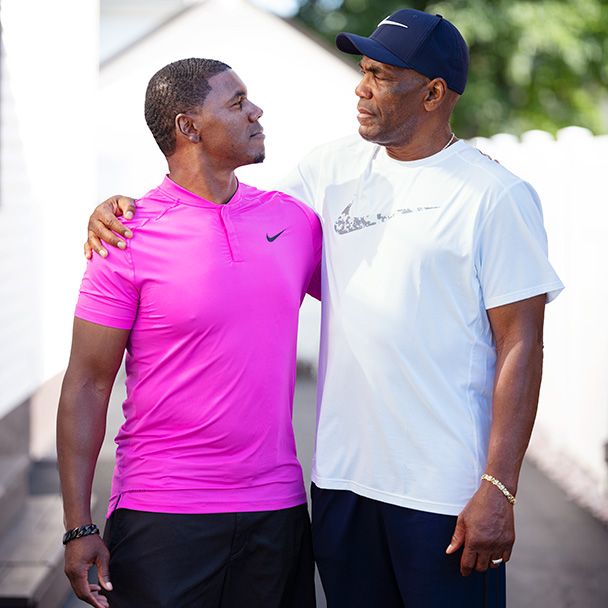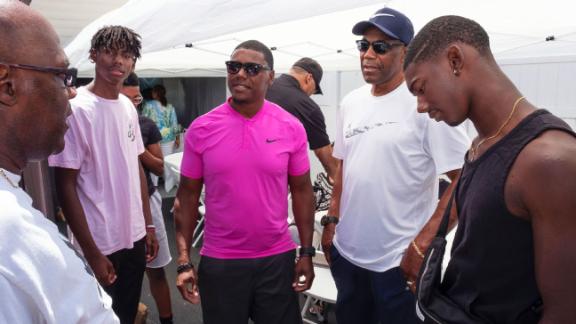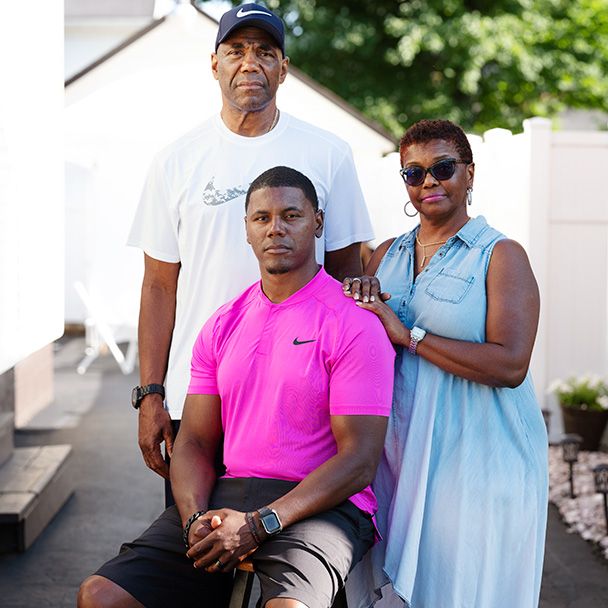Dr. Narcisse
Veteran
The next Antwon Fisher
@Ziggiy @mastermind @obarth
@Ironman @klutch2381 @Silkk
@portcityplaya @klutch2381

The jaw-dropping story behind an NFL coach's search for his family
@Ziggiy @mastermind @obarth
@Ironman @klutch2381 @Silkk
@portcityplaya @klutch2381
No one outside of her immediate family and her cousin Robin knew about the baby. Only when she was preparing to sign the adoption papers did Briggs consider sharing the news with the father, a teenage fling who had gone off to college before she discovered she was pregnant. She ultimately decided against it.
With her parents' blessing, Briggs had decided that when the child was born, she would put him up for adoption.
In her last interaction with the adoption agency, Briggs was told that baby Jon had been placed with a doctor and his wife in Columbus, Ohio.
IN EARLY 2017, now-Kansas City Chiefs running backs coach Deland McCullough signed on to coach the running backs at USC, having spent the previous six years in the same position at Indiana University.
Things changed when he had his first child, and as his family grew, so too did his desire to know of his past. He wanted to know who gave him his deep voice and his muscular build and to whom he owed his pensive nature and quiet intensity. He wondered where son Dason got his height and which grandfather or uncle his bespectacled son, Daeh, might favor. He was so hungry for information that he never questioned whether the search might lead him to answers he couldn't handle.
ADELLE COMER WAS living in a three-bedroom house on a cul-de-sac in Youngstown with her husband, popular local radio host A.C. McCullough, and their young son, Damon, when she got the call. It was a social worker reaching out to see whether she and A.C. would come see an infant at an adoption agency in Pennsylvania. Not long after the tragic death of their second son, Alex, who died of an intestinal birth defect after just 28 days, the young couple had started serving as foster parents, and they were looking to adopt. In January 1973, they met 6-week-old baby Jon.
By March of that year, Jon Kenneth Briggs had been renamed Deland Scott McCullough, and he was living at home with his new parents, Adelle and A.C.
When Deland was in elementary school, Comer came home to find that he had cut three gashes into the couch for which she had just finished two years of layaway payments. Kids at school had been teasing him about being adopted, and he accused Comer of loving him less than her birth son, Damon. She explained that she loved the two boys differently, one because he had been in her belly and the other because she had chosen him. After that, Deland McCullough rarely spoke of his adoption. He got good at pretending to be whole.
"The void was there," he says. "I wish that it wasn't, but I think I did a good job of hiding it."
After the divorce, Comer had relationships with a few other men, some of whom were combative and abusive. "Some men don't understand what respect is," she says. "I've got two sons, and I'm not gonna allow my children to grow up with this type of lifestyle, this drama."
Damon sometimes tried to physically defend her, but then he left for college, and Deland felt too small, physically and emotionally, to step in. His response to the violence was to try to tune it out, become emotionless, put blinders on and dream of a way out of the house and out of Youngstown.
Comer took Deland with her to therapy for a while, hoping to make things at home a little less turbulent. New boyfriends came and went, but she mostly settled into life as a single mom, taking on multiple jobs to support her sons, including as a switchboard operator at the Cuyahoga County Department of Human Services, a waitress, a social worker and a short-order cook at the local bowling alley. She did her best to rear the boys on her own, but they moved a lot, and she struggled to pay the bills, sometimes having to choose between electricity and a working phone.
"It was an escape," he says. "When I was out there practicing, you didn't think about the electric is off, you know? You didn't even think about anything like that. You were just out there balling, doing your thing and competing and bonding with your friends."
Comer was a one-woman cheer squad, bringing multiple signs to Deland's games and running up and down the sideline rooting him on. One night when her ride didn't show up, she took her son's moped to the game. He looked up in the stands and saw her, still wearing his moped helmet, hollering and screaming for him: "D-MACK! D-MACK!"
As a junior defensive back, Deland saw himself playing football at a small school or enlisting in the Navy, but an opportunity to show his talent at the running back position his senior year drew the eye of college recruiters. Suddenly, he was being pursued by the likes of Jim Tressel, then the head coach at Youngstown State; Bob Stoops, then the defensive backs coach at Kansas State; and Sherman Smith, then the running backs coach at Miami of Ohio.
DELAND MCCULLOUGH LOOKED out the window of his third-period English class at Campbell Memorial High School and saw a tall man emerge from a candy apple red Mercedes-Benz with tan interior and tricked-out gold rims. A few minutes later, he got a pink slip message to leave class and go to the office, where the tall man stuck out his hand and said, with a firm handshake, "I'm Sherman Smith, the running backs coach at Miami University."
A former star quarterback at Miami, Smith was a second-round draft pick at running back for the Seahawks and went on to play eight years in the NFL. He had a booming voice, thick arms and broad, square shoulders. He walked and talked and carried himself like a former pro; McCullough was immediately drawn to him.
"It was just something about his personality," McCullough says. "The way he presented himself. He had things that I hadn't seen out of a man or mentor. He was on top of his details. He was successful. He had played in the NFL. He got his degree. I wasn't around that type of person.
"The Mercedes was nice, too, you know?" he laughed. "That was slick."
As a Youngstown native himself, Smith thought guys from the area were tough, but the coaches told him McCullough was special -- a thin kid, but when he couldn't run around people, he'd go through them. McCullough was serious that day in the office, offering few smiles and answering with a lot of "Yes, sir" and "No, sir," but he was also intelligent and expressive. Smith thought he'd very much like to work with him.
The feeling was mutual. Despite interest from other schools, the decision to attend Miami University was easy for McCullough, especially after the home visit, during which Smith charmed Comer as well.
"Well, Coach Smith was hard not to love," Comer says, laughing. "I fell in love with him the first time. He was just a gentleman. And he was very attentive and respectful to me."
Smith drove them to visit the school and was back at Campbell Memorial a few months later for signing day, when McCullough signed his letter of intent to play at Miami. When McCullough arrived on campus, the coaches tried to turn him into a wide receiver, but he pushed for an opportunity to work with Smith and the running backs, accepting a redshirt freshman year to pursue the position he believed he was meant to play.
"I would tell the players, 'You may not be looking for a father, but I'm going to treat you like you're my sons,'" Smith says. "And so I just looked at every guy like my son. I just wanted to be a positive role model for Deland and exemplify what I thought my father exemplified for me."
"He was everything," McCullough says. "If anything was going on, I was going to talk to Coach Smith. Everybody in that room gravitated towards Coach Smith just because that's the type of person he was. What he's about rubs off on you, so I always wanted to be around that."
Smith left Miami University after that season to be the tight ends coach at the University of Illinois, but he and McCullough stayed in touch. He watched from afar as McCullough put together a Hall of Fame career in Oxford, rushing 36 touchdowns and setting a school record with 4,368 rushing yards. McCullough was surprised when his name wasn't called in the 1996 draft, but he was invited to a few workouts and ended up signing with the Bengals. He was leading the NFL in preseason rushing before he suffered a season-ending knee injury in Cincinnati's final exhibition game. After a few more looks in the NFL, a couple of seasons in Canada, several more knee surgeries and a brief flirtation with the XFL, McCullough finally accepted in 2001 that the dream of pro football was over.
A few years later, married and the father of one son, McCullough took a job teaching communications and coaching football at Harmony Community School in Cincinnati. Despite rising to the ranks of principal and making a good salary, his first taste of coaching gave him the itch to coach full time, and he reached out to his alma mater about an opportunity to join the staff.
Smith had followed a similar path, first teaching and coaching high schoolers, then working his way up the ranks from Miami University to the University of Illinois, the Houston Oilers, the Washington Redskins and, finally, the running backs coach for the Seahawks. He was with Seattle when he got a call from McCullough, asking for advice as he started his new job at Miami University.
By 2014, McCullough was coaching at Indiana University, and the two were reunited on the field, as Smith welcomed McCullough to Seattle for a coaching internship. He saw firsthand that his former player had a real future on the sideline. He had no idea that off the field, McCullough was consumed by the search for his family.
A FEW DAYS before Thanksgiving 2017, Carol Briggs got home from work, sat down on the couch and opened a Facebook message from an unfamiliar man: "Did you have a baby in 1972 in Allegheny County that you placed for adoption?"
Briggs had thought often of baby Jon. Every year, she wished him a "Happy Birthday" on her Facebook wall, and she regularly searched adoption websites to see if he might be looking for her. Briggs could still hear her mother's voice, saying more and more often in the years before she died, "You need to find that boy."
She called her older brother, who warned her that the message might be from someone trying to bribe or extort her. She responded anyway, and after a few short messages, she agreed to speak to McCullough on the phone that night after he got out of practice. In the hours before the call, she Googled his name and read every article she could find. She stared at his pictures and tried to find herself in his face. It wasn't hard to see it now: the mouth, the nose, the eyes.
McCullough called Briggs from a hallway at USC as he awaited the start of a football family dinner.
They spoke as if they'd known each other for years, an easy back and forth as they shared where life had taken them in the 44 years since she'd laid him down on that bed and let him go. She learned that he had never gone to live with a doctor in Columbus, that in fact they had been just a few miles away from each other in Youngstown for all of McCullough's childhood. She likely shopped at the same grocery store as Adelle Comer, perhaps even passing young McCullough in the aisles. She was certain that her sports-fanatic father, now deceased, had read about McCullough's high school exploits in the paper.
McCullough was overjoyed to find his birth mother, though a mother had never been what he was missing.
"Within probably the first five or six minutes, he says, 'Who is my father?'" Briggs says.
She hesitated but decided McCullough had a right to know.
"Your father's name is Sherman Smith," Briggs told him.
McCullough, leaning against a wall in the hallway, felt as though he might pass out.
He started flashing back to all of his memories with Smith and all the times people had joked about him being a carbon copy of his coach. Throughout college, when he returned to coach at Miami University, during his internship with the Seahawks.
"'Man, you and Coach Smith look alike.' 'Man, you all walk alike.' 'Y'all this, y'all this,'" McCullough says. "There's no reason to connect those dots because you weren't even thinking about them. A sense of pride that went through me, like, 'Wow, that explains these things.' And then I also start thinking about all the similarities of our path. That just blew me away."
Not only had he known his father for 28 years, but Smith was also his mentor, the man he had looked up to since he was 16 years old. McCullough thought of a photo of him and Smith at Campbell Memorial High, both beaming as he signed his letter of intent to play at Miami University. The same photo he had pinned to the corkboard that hung in his college dorm room. The same photo that was at that moment sitting in a Ziploc bag in the drawer of his nightside table, a bag that had traveled with him through every job and every move.
"If you would have told me to pick who my father was, there's no way I would have picked him because I might have thought I wasn't worthy for him to be my father," McCullough says. "I felt like my blessings came full circle because I'd always wanted to be somebody like him."
"I could hear him take a big breath," Briggs says. "And I could kind of hear him choke up a little. And finally he says, 'Well, I've known Sherman my whole life.'"

Before learning about his genetic relationship with Sherman Smith, little did Deland McCullough know that he'd known his biological father for 28 years. Ruddy Roye for ESPN
The jaw-dropping story behind an NFL coach's search for his family
Last edited:









